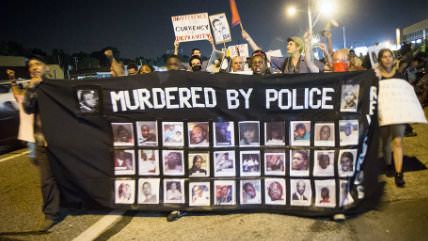Justice Was Not Served in Ferguson. What Happens Now?
If we fail to address this maturely, it will lead us further down the path to a police state.

The city of Ferguson, Missouri, is now burned into our consciousness in a way that few other places are. In my youth, the race riots in Newark, Detroit, and Los Angeles marked turning points in my own and in the public's awareness of the problems of a black underclass that perceives itself as being so unfairly governed by a white power structure that it resorted to violence.
Those disturbances also revealed the difficulties of hardworking black families trying to make decent lives for themselves by endeavoring to leave the inner cities and, as basketball player-turned-philosopher Charles Barkley stated, the opportunities of inner city "scumbags" willing to steal and pillage and incite for some temporary material or political gain.
We saw this again in Los Angeles during the Rodney King affair, in which a jury in a state prosecution acquitted two white cops of savagely beating an unarmed black man, and the mobs rioted. Thereafter, the same cops were charged with federal crimes based on the same facts and were convicted by a federal court.
As bad as it was for those cops to have beaten King, it was worse for the government to violate the prohibition on double jeopardy by using the legal fiction of federal jurisdiction and federal prosecution as being so distinct from what the state of California had tried and failed to do that the second trial did not constitute a constitutionally prohibited repeated attempt to convict. It did.
Fast-forward to Ferguson, and we see the toxic mixture of a black underclass and a white power structure and the corrupt advantages that people on the make and people on the take can exploit from it.
In Ferguson, the law enforcement case is far more straightforward than the racial complexities. A white cop put 10 bullets into the body of an unarmed black youth with whom he was wrestling for control of his gun. The cop succeeded in wresting the gun from the youth and then proceeded to kill him. Once the cop had control of the gun and the youth had been immobilized, all additional gun firing is criminal. That the youth was the aggressor does not diminish the cop's obvious criminal overuse of deadly force.
The grand jury—whose job is merely to certify that the state has enough evidence to justify the charges it seeks to present against a given defendant—was subjected to the type of evidence that only trial juries hear, including a soliloquy from the cop himself and all the exculpatory evidence the prosecutor could find.
Prosecutors often loathe and sometimes even hide exculpatory evidence, but this county prosecutor must have been afraid to seek an indictment, and so he shrewdly manipulated this grand jury out of its role of determining whether the state had probable cause to try the cop and into the role of a trial jury, which is to judge whether the state has proved guilt beyond a reasonable doubt.
If the feds now come along and indict the cop on federal charges, they would be correcting the error and perversion of the grand jury. This would not be double jeopardy as in the King case, because the cop in Ferguson has never been charged on the basis of the facts in this case.
Would we even know of this case if both the cop and the youth had been of the same race? Probably not.
The long and unhappy history of race relations in America now has another fiery chapter with more tragedy. The tragedy is the result of the governmental use of race as a basis for decision-making. When cops are hired because they are white, when police suspect criminal behavior on the part of youth because the youth is black and then act on those suspicions, when a predominantly black populace feels—however accurately or inaccurately—that it is being treated unfairly by the government and the government fails to address this perception, when hucksters and scumbags who are drawn to these conflagrations use racial vulnerability to rob and pillage and arouse and destroy, and when the sides are arrayed along racial lines, the government has failed to protect the liberty and property of the people it was hired to protect.
The failure in Ferguson is across the board. From a city government whose police force makes its minority populace feel vulnerable and defends an unnecessary public killing by one of its cops, to a county prosecutor afraid to take responsibility for a proper public prosecution, to a governor missing in action, to a president who sounds like he wants to federalize police, we have an out-of-control stewpot boiling over into a wave of destruction.
The police need to be strong enough to protect life, liberty, and property, and vulnerable enough to tolerate all political opinions, even those filled with ignorance and hate. The militarization of local police—perfected during the past two presidential administrations, which have given local cops military surplus intended to be used on enemy armies in foreign lands—if uncorrected, will lead to a police state. A police state is one in which the government's paramount concern is for its own safety, and not for the lives, liberties, and properties of those it has sworn to protect.
Are the police our servants or our masters? Can the mobs in the streets express political opinions without harming innocents? Can the government be dedicated to preserving the personal liberty—the right to be oneself—of even the most vulnerable among us? Can we use the tragedy of Ferguson to achieve a freedom-generated nonracial consensus on all this? If we fail to address this maturely, I fear that more Fergusons will soon be upon us.


Show Comments (105)